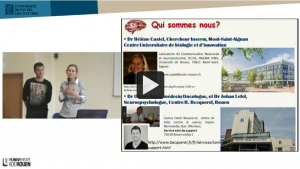Documentation
Press kit
Download our PDF format booklet summarizing the key information. Also find our logo in high-definition.

Patient testimonials
Ms H., 54 years, state official in the public market industry was, and is currently treated for a breast cancer by surgery, radiotherapy and hormonotherapy.
After starting the hormonotherapy treatment, Ms H. has felt troubles of recent memory:
- Some difficulties in the remembering of places where she recently spent her vacation,
- Regular oversights to turn off the stove or the iron, for instance,
- When driving or when moving in her house, needs to think more importantly than before, to know where she should go or what she comes to pick.
Her difficulties are associated with impaired concentration during book readings (needs to proofread several times the same passage from a book). In addition, Ms. H. feels readily exceeded by the current administration of personal papers, making her irritable.
Returning to work is planned in a few months, causing a degree of apprehension.
Vidéos
UTLC video conference : Forget the cancer, not the rest ! When cancer and its treatments dip yours thoughts into the fog
Patients with cancer present cognitive disorders such as visual and spatial memory alteration, impaired mental flexibility or psychomotor slowing. These disorders are described in the literature under the term of “chemo fog” in reference to London’s fog. (Video 1 hour)

When cancer impacts memory
By the Allodocteurs.fr 17/02/2011 editorial board
“Chemo fog” is a known condition shared by a number of patients treated with chemotherapy. It is a kind of brain fog which alters concentration and can be very disabling. Side effects associated with cancer, such as fatigue and memory disorders, are now better taken into account by oncologists. Around 5 min of video.

